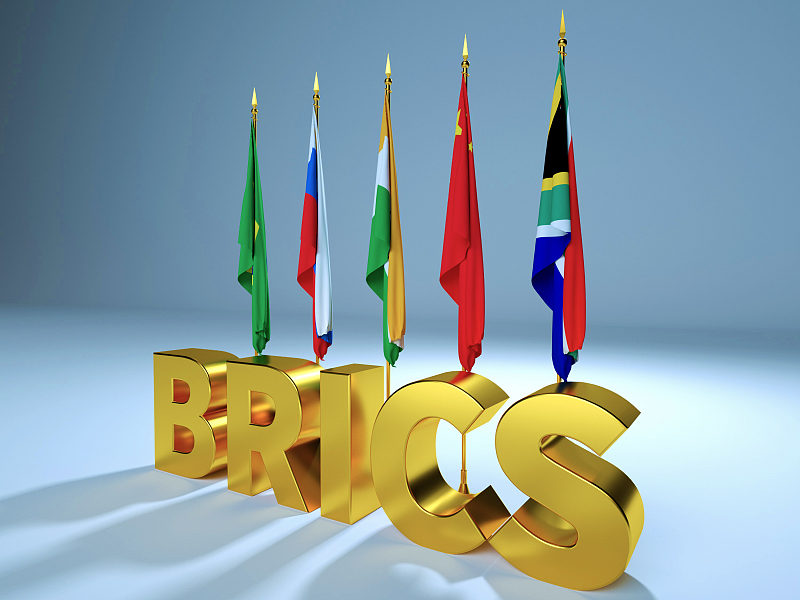
Commercial office buildings and high-rise towers in the central business district area of Johannesburg, South Africa, August 15, 2023. /CFP
Commercial office buildings and high-rise towers in the central business district area of Johannesburg, South Africa, August 15, 2023. /CFP
Editor's note: Ehizuelen Michael Mitchell Omoruyi, a special commentator for CGTN, is the executive director of the Center for Nigerian Studies under the Institute of African Studies at Zhejiang Normal University. The article reflects the author's opinions and not necessarily the views of CGTN.
The 15th BRICS Summit will be held in Johannesburg, South Africa from August 22 to 24. BRICS is the acronym for an emerging market group comprising Brazil, Russia, India, China and South Africa based on the first letters of their names. The emergence of BRICS as a major global player has raised hopes that a win-win partnership could foster the development of the African continent.
BRICS countries resist cold-war mentality and oppose hegemonism. It is committed to promoting multilateralism, mutual respect and cooperation, fairness and justice by cementing a new global alternative that represents the right trend of history.
BRICS countries represent more than 40 percent of the world population and over 20 percent of global total economic output. They have been bearing the development expectations of emerging markets, acting as a mechanism for cooperation among developing countries and as a platform for South-South cooperation, and have made substantive and solid progress in practical cooperation across the board.
Unlike certain nations aiming to split the world, and trying to expand military alliances to seek "security," the BRICS group is rising at a faster pace than the G7 and is focused on injecting new impetus into maintaining world peace, promoting common development with African countries, promoting South-South cooperation and a multipolar world order. This resonates with Africa's vision of greater self-dependence and regional integration.
The 2022 economic data survey from the African Development Bank indicates BRICS is now Africa's largest trading partner with trade expected to reach over $500 billion by 2030, with 60 percent from China. BRICS is also becoming a significant investor in Africa, especially in the manufacturing and service sectors.

Through the above, African countries are currently adopting a strategic autonomy approach against the West. This is because Western actors are prioritizing and imposing their own interests and values in international politics and their relationship has created discomfort for African countries.
At this point, African countries have seen that the state of being reliant on the West creates an important vulnerability in a process where interests conflict. In particular, the fact that African countries mainly sell their energy and other resources to the West, conduct trade in dollars, and use the West's SWIFT system is seen by African countries as an important weakness. Africans see it this way because the West has used the dollar as an economic and political control coupled with the use of institutions such as the IMF and the World Bank.
So when we see African countries fighting for autonomy, what they mean is that they want total independence. Total independence means economic emancipation, whereby "freedom" must mean Africans are capable of trading at levels which are based on equality in which Africans can run their own affairs without being dictated to by the West. As such, there is a need to have a completely reconfigured architecture of the world economy where total independence is certain.
In this context, and since it is clear that African countries opposed the Western-centered system and have adopted a common approach at the point of coming together to bring dynamism to existing African structures, the emergence of the BRICS group – which is bringing together new countries that are emerging out of the domination of the West – is beginning to make sense since they offer alternatives to African countries to make sure African economies are independent economically.
African countries believe that this paradigm shift will protect them against Western pressure. This is another driving and attractive force propelling African countries to partner with BRICS.
Therefore, as a way of benefiting from this new partnership, African countries should seek to deepen their partnerships with BRICS and leverage their strengths and resources for mutual gain. This can be done if African countries adopt a strategic approach to engaging with BRICS based on a clear assessment of their respective strengths and weaknesses, and a focus on mutual gains and shared values.
This requires strengthening domestic institutions and policies, enhancing regional integration and cooperation, and engaging in a more assertive and proactive manner with BRICS countries and other emerging powers based on a shared vision of mutual benefits, inclusivity and sustainability. Particularly, African countries need to leverage their natural resources, cultural diversity and strategic location.
They also need to capitalize on the opportunities provided by BRICS countries and the evolving global economic order by prioritizing investments in education, technology, innovation and infrastructure as well as promoting inclusive and sustainable growth.
Above all, African countries should try to attract more investments and trade from BRICS countries and other partners. By doing so, the continent of Africa can unlock its potential and contribute to shaping the future of the global economy in a more equitable and balanced manner.
(If you want to contribute and have specific expertise, please contact us at opinions@cgtn.com. Follow @thouse_opinions on Twitter to discover the latest commentaries on CGTN Opinion Section.)